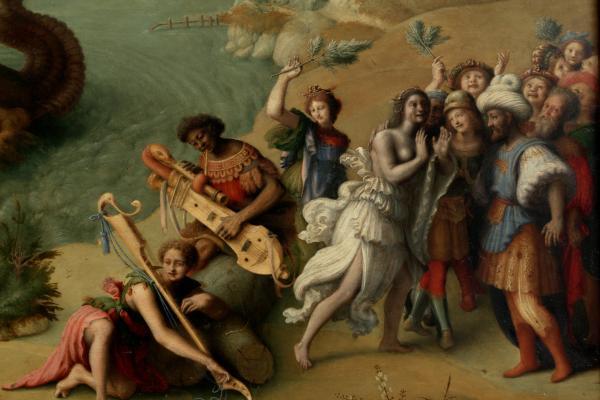
Make sure to also visit the event page for the workshop component of the colloquium, "Teaching Premodern Race."
The goal of this year’s MRGSA colloquium is to discuss and engage with issues of race in premodern studies and its scholarship—including its literature, religion, art, history, and culture—while thinking about how scholars can locate and explore the way race functioned premodernity. By investigating race in medieval and early modern studies and supporting scholars of color, MRGSA aims to amplify race as a lens of investigation that will encourage participating scholars—faculty, staff, graduate, and undergraduate affiliates of CMRS and Ohio State University—to explore and deal with questions of race in the pre-modern world. There is a dire need to continue integrating premodern critical race studies into our curricular development and to expand and diversify our inclusion efforts in the field. MRGSA seeks to develop rich and engaging conversations about premodern critical race studies and to push us towards using race as a significant and crucial framework in our field.
This event is free and open to the public.
This event is co-sponsored by the Medieval and Renaissance Graduate Student Organization, Center for Medieval and Renaissance Studies, the Humanities Institute and Disability Studies Program.
The first portion of the colloquium will be two keynote addresses given by Professor Jonathan Hsy (George Washington University) and Ambereen Dadabhoy (Harvey Mudd College).
Jonathan Hsy (“shoo”), Associate Professor of English at George Washington University, will present "Crafty Mobilities: Medieval Poetics and Critical Refugee Studies." He'll explore how medieval poetry can engage with the contemporary field of critical refugee studies. My case studies include the collaboratively-authored Refugee Tales (mobile transnational storytelling endeavor invoking Chaucer’s incomplete Canterbury Tales), the medieval-themed poetry by incarcerated migrants at Angel Island, and present-day Asian immigrant/refugee poets remaking premodern Western traditions (such as Ouyang Yu and Ocean Vuong). How does a global approach to medieval poetics transform our understandings of race, disability, mobility, and social justice?
Jonathan is Affiliated Faculty in Women’s, Gender, and Sexuality Studies and the Sigur Center for Asian Studies. He teaching and research interests include Comparative Literature, Critical Theory, and Disability Studies, and he teaches in GW’s Asian American Studies minor. Hsy is the author of Antiracist Medievalisms: From “Yellow Peril” to Black Lives Matter (Arc Humanities, 2021) and Trading Tongues: Merchants, Multilingualism, and Medieval Literature (Ohio State UP, 2013) and he is the co-editor of A Cultural History of Disability in the Middle Ages (Bloomsbury, 2020). He co-directs Global Chaucers, serves on the Executive Board of RaceB4Race, and has served on the MLA’s Committee on Disability Issues in the Profession.
Ambereen Dadabhoy, Associate Professor of Literature at Harvey Mudd College, will present "The Muslims Are Coming: The Tempest’s Brave Old Worlds." Investigating the Mediterranean setting of Shakespeare’s The Tempest, on an island somewhere between Naples and Tunis, she seeks to contextualize how this Mediterranean geography informs the construction of the play’s absent women, Sycorax and Claribel. By focusing on the play’s geography, Ambereen argues that the Muslim Mediterranean informs and challenges the plot’s focus on achieving European, dynastic hegemony.
Dr. Dadabhoy's research focuses on cross-cultural encounters in the early modern Mediterranean and race and religion in early modern English drama. She investigates the various discourses that construct and reinforce human difference and in how they are mobilized in the global imperial projects that characterize much of the early modern period. Ambereen is co-author with Dr. Nedda Mehdizadeh of Anti-Racist Shakespeare (Cambridge Elements 2023). She has just completed her monograph, Shakespeare through Islamic Worlds (coming soon from Routledge), which investigates the paucity of Muslim representation in Shakespeare's works, despite their ubiquitous presence in his preferred setting of the Mediterranean Sea. Her talk for MRGSA is a preview of this book.
The Humanities Institute and its related centers host a wide range of events, from intense discussions of works in progress to cutting-edge presentations from world-known scholars, artists, and activists, and everything in between. In our current moment of riding the unpredictable currents of the pandemic, we reaffirm the value of in-person engagement. We strive to amplify the energy in the room. But we also recognize the need to be careful and the fact that not all our guests will be able to visit our space. We, therefore, will continue to offer Zoom access to all our events upon request. If you wish to have such access, please send your request to cmrs_gaa@osu.edu.
